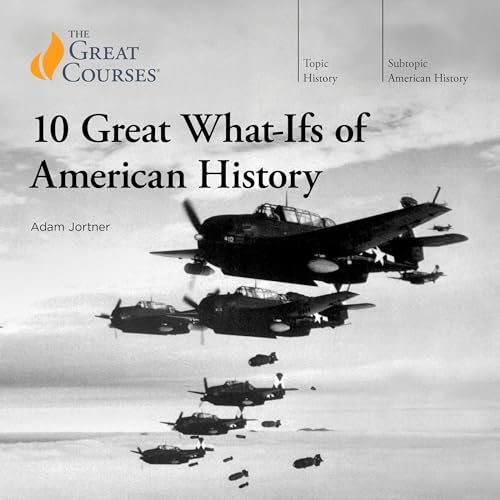
Released 4/2024
MP4 | Video: h264, 1280x720 | Audio: AAC, 44.1 KHz, 2 Ch
Genre: eLearning | Language: English | Duration: 10 Lessons ( 4h 14m ) | Size: 3.54 GB
Historians have a term for this type of speculation. A counterfactual history imagines a different person, a different decision, different luck in a critical momentand the way a small change could have transformed history as we know it. What if Christopher Columbus never got the money to sail in 1492 What if the Union lost the Battle of Gettysburg Or President John F. Kennedy escaped assassination
10 Great What-Ifs of American History offers you the chance to ponder some of the most captivating counterfactuals in the story of our nation. Over 10 eye-opening lectures, Professor Adam Jortner of Auburn University walks you through some of the most astonishing chance events in American history, from the signing of the Constitution to the moon landing. Joining him are six experts, hand-selected for their depth of knowledge in particular aspects of US history. Together, Professor Jortner and his colleagues take you through a mind-bending exploration of the history that could have been. Captivating storytellers and imaginative thinkers, these experts ask how much of history is shaped by split-second decisions, near misses, and sheer dumb luck.
By reflecting on what didnt happen, 10 Great What-Ifs of American History gives you new insights on what did happenand the impact on our world today.
Imagine What Could Have Been
As youll learn, a well-constructed counterfactual is about more than flipping a switch or taking a guess. Historians look for moments of contingencytimes when something unlikely happened or when events turned on a moment that could have gone either way. What happens when you take away favorable weather conditions or delay an event by 15 minutes
The most famous battle in the American Civil War provides your first excellent counterfactual. Most history enthusiasts understand the Battle of Gettysburg as a turning point in the war, but relatively few people have considered the role of Little Round Top, an unfortified area of high ground the Confederates hoped would allow them to bombard the Union troops.
The Confederates were on their way to this perch when, by chance, a Union army engineer arrived to check a signal station, saw the rebel troops, and alerted the Union forces. What if this engineer had arrived 15 minutes later Could the Confederates have won the battle And if so, would the morale boost have enabled them to negotiate an end to the war
Although we cannot know for certain, Professor Jortner and his colleagues present a plausible scenario for Confederate victory that would have created a world unrecognizable to us today. The United States, emancipation, and even all of world history hinged on one persons looking a certain direction, from a certain vantage, at a certain moment.
Throughout these lectures, youll dig into many such moments of contingency. What if a bullet had missed What if a scientist had not died in surgery What if a few electorates had changed their votes While history may feel inevitable, its jaw-dropping to see how our story is constantly hanging by a threadand it reminds us how important our own choices and decisions are, even today.
Understanding Our World Today
Reflecting on what could have happened is more than a neat thought experiment. While its fascinating to consider the threads on which history hangs, pulling on these threads helps us better understand the world as it is.
For example, the US Constitution was only ratified due to a few political tricks and a small handful of persuadable voters. In the wake of the Revolutionary War, the 13 colonies had just unseated a centralized power, so many were wary of establishing a new central government. The Constitutions passage may have depended on how one man scheduled the ratification convention in New Hampshire! Professor Jortner and his colleagues dig into the debates, compromisesand a few shenanigansthat would become the hallmark of the American experiment.
In an age of digital media and constant news, it can sometimes feel like individuals dont make a difference in the world. These counterfactuals explain that individual decisions and timely responses to problems can change the worldsometimes quite profoundly. Learning about how small things can lead to big outcomes can help us rethink our own debates and issues as we struggle with the modern world.
10 Great What-Ifs of American History shows that history doesnt exist in a vacuum. Working to gain a better sense of how historical figures imagined their worldsand their futuresreveals that history is a poem, not a flow chart. Much of what seems inevitable now didnt seem that way at the time. The what-ifs of this course underscore how incredible history really is.
What Will You Learn
Survey the pivotal moments of American history to learn what happenedand why they mattered
Gain new insight on the Constitution, the Civil War, World War II and other historical turning points
See how one small change of circumstances could have reshaped world history
Reflect on the role of chance in creating a dynamic history even today
HomePage:
https://www.thegreatcourses.com/courses/10-great-what-ifs-of-american-historyDOWNLOAD
rapidgator
https://rapidgator.net/file/e5adc3e08d2595f82a63108b1607811e/b5mwhwqB__10_Great_W.part1.rar.html
https://rapidgator.net/file/a323b6424d7b812e10fe3ddf0df56973/b5mwhwqB__10_Great_W.part2.rar.html
https://rapidgator.net/file/61e517688bd9fc19413c5ac0b3638069/b5mwhwqB__10_Great_W.part3.rar.html
https://rapidgator.net/file/1abd7b14389c5c3c27915bddb1e5948a/b5mwhwqB__10_Great_W.part4.rar.html
nitroflare
https://nitroflare.com/view/E4862A69AFEC90D/b5mwhwqB__10_Great_W.part1.rar
https://nitroflare.com/view/7DF79725454B26B/b5mwhwqB__10_Great_W.part2.rar
https://nitroflare.com/view/773D544C65CBAB2/b5mwhwqB__10_Great_W.part3.rar
https://nitroflare.com/view/4125B8BEF729E7B/b5mwhwqB__10_Great_W.part4.rar

